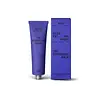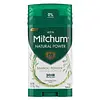What's inside
What's inside
 Key Ingredients
Key Ingredients

 Benefits
Benefits

 Concerns
Concerns

 Ingredients Side-by-side
Ingredients Side-by-side

Maranta Arundinacea Root Powder
Skin ConditioningHelianthus Annuus Seed Oil
EmollientSodium Bicarbonate
AbrasivePrunus Armeniaca Kernel Oil
MaskingCaprylic/Capric Triglyceride
MaskingButyrospermum Parkii Butter
Skin ConditioningMagnesium Oxide
AbsorbentDiatomaceous Earth
AbrasiveParfum
MaskingSilica
AbrasiveGlyceryl Stearate
EmollientGlyceryl Behenate
EmollientZinc Oxide
Cosmetic ColorantHydrogenated Castor Oil
EmollientTocopherol
AntioxidantGlycine Soja Oil
EmollientCalendula Officinalis Flower Extract
MaskingLimonene
PerfumingLinalool
PerfumingEugenol
PerfumingCitral
PerfumingCitronellol
PerfumingGeraniol
PerfumingCoumarin
PerfumingMaranta Arundinacea Root Powder, Helianthus Annuus Seed Oil, Sodium Bicarbonate, Prunus Armeniaca Kernel Oil, Caprylic/Capric Triglyceride, Butyrospermum Parkii Butter, Magnesium Oxide, Diatomaceous Earth, Parfum, Silica, Glyceryl Stearate, Glyceryl Behenate, Zinc Oxide, Hydrogenated Castor Oil, Tocopherol, Glycine Soja Oil, Calendula Officinalis Flower Extract, Limonene, Linalool, Eugenol, Citral, Citronellol, Geraniol, Coumarin
Caprylic/Capric Triglyceride
MaskingZea Mays Starch
AbsorbentCocos Nucifera Oil
MaskingStearyl Alcohol
EmollientTapioca Starch
Maranta Arundinacea Root Extract
SmoothingSodium Bicarbonate
AbrasiveHydrogenated Castor Oil
EmollientTriethyl Citrate
MaskingParfum
MaskingBambusa Arundinacea Stem Powder
AbrasiveAlpha-Isomethyl Ionone
PerfumingBenzyl Benzoate
AntimicrobialBenzyl Salicylate
PerfumingCoumarin
PerfumingEugenol
PerfumingHexyl Cinnamal
PerfumingLimonene
PerfumingLinalool
PerfumingCaprylic/Capric Triglyceride, Zea Mays Starch, Cocos Nucifera Oil, Stearyl Alcohol, Tapioca Starch, Maranta Arundinacea Root Extract, Sodium Bicarbonate, Hydrogenated Castor Oil, Triethyl Citrate, Parfum, Bambusa Arundinacea Stem Powder, Alpha-Isomethyl Ionone, Benzyl Benzoate, Benzyl Salicylate, Coumarin, Eugenol, Hexyl Cinnamal, Limonene, Linalool
 Reviews
Reviews

Ingredients Explained
These ingredients are found in both products.
Ingredients higher up in an ingredient list are typically present in a larger amount.
This ingredient is an emollient, solvent, and texture enhancer. It is considered a skin-softener by helping the skin prevent moisture loss.
It helps thicken a product's formula and makes it easier to spread by dissolving clumping compounds.
Caprylic Triglyceride is made by combining glycerin with coconut oil, forming a clear liquid.
While there is an assumption Caprylic Triglyceride can clog pores due to it being derived from coconut oil, there is no research supporting this.
Learn more about Caprylic/Capric TriglycerideCoumarins are a group of substances found naturally in plants. There are over 1300 types of coumarins identified. It has a natural vanilla scent.
Coumarin is an identified EU known allergy, meaning it may cause an allergic reaction when applied to the skin.
In many countries, coumarin is banned as a food additive. However, it can be found in soaps, tobacco products, and some alcohol drinks.
Plants use coumarins as a chemical defense. Some plants that have coumarins include lavender, tonka beans, and yellow clovers.
Learn more about CoumarinEugenol is naturally found in cloves, basil, and bay leaves. It is an aromatic oil used to add fragrance to a product. The scent of eugenol is described as "clove-like". Eugenol is a known EU allergen, meaning it causes contact allergies.
Studies show eugenol possesses antibacterial and antioxidant properties.
Besides cosmetics, eugenol is also added as a flavor in teas and cakes.
Learn more about EugenolHydrogenated Castor Oil is created by adding hydrogen to castor oil. This helps stabilize the castor oil and raises the melting point. At room temperature, hydrogenated castor oil is solid.
Castor Oil helps moisturize the skin. It is rich in a fatty acid called ricinoleic acid. This fatty acid helps prevent moisture loss on the skin. This helps keep your skin soft and hydrated. Ricinoleic acid also has anti-inflammatory and pain reducing properties.
As a wax-like substance, Hydrogenated Castor Oil acts as an emollient. Emollients help keep your skin stay soft and smooth by creating a barrier. This barrier helps trap moisture.
Hydrogenated Castor Oil may not be fungal-acne safe. We recommend speaking with a professional.
Learn more about Hydrogenated Castor OilLimonene is a fragrance that adds scent and taste to a formulation.
It's found in the peel oil of citrus fruits and other plants such as lavender and eucalyptus. The scent of limonene is generally described as "sweet citrus".
Limonene acts as an antioxidant, meaning it helps neutralize free radicals.
When exposed to air, oxidized limonene may sensitize the skin. Because of this, limonene is often avoided by people with sensitive skin.
The term 'fragrance' is not regulated in many countries. In many cases, it is up to the brand to define this term. For instance, many brands choose to label themselves as "fragrance-free" because they are not using synthetic fragrances. However, their products may still contain ingredients such as essential oils that are considered a fragrance.
Learn more about LimoneneLinalool is a fragrance and helps add scent to products. It's derived from common plants such as cinnamon, mint, citrus, and lavender.
Like Limonene, this ingredient oxidizes when exposed to air. Oxidized linalool can cause allergies and skin sensitivity.
This ingredient has a scent that is floral, spicy tropical, and citrus-like.
Learn more about LinaloolParfum is a catch-all term for an ingredient or more that is used to give a scent to products.
Also called "fragrance", this ingredient can be a blend of hundreds of chemicals or plant oils. This means every product with "fragrance" or "parfum" in the ingredients list is a different mixture.
For instance, Habanolide is a proprietary trade name for a specific aroma chemical. When used as a fragrance ingredient in cosmetics, most aroma chemicals fall under the broad labeling category of “FRAGRANCE” or “PARFUM” according to EU and US regulations.
The term 'parfum' or 'fragrance' is not regulated in many countries. In many cases, it is up to the brand to define this term.
For instance, many brands choose to label themselves as "fragrance-free" because they are not using synthetic fragrances. However, their products may still contain ingredients such as essential oils that are considered a fragrance by INCI standards.
One example is Calendula flower extract. Calendula is an essential oil that still imparts a scent or 'fragrance'.
Depending on the blend, the ingredients in the mixture can cause allergies and sensitivities on the skin. Some ingredients that are known EU allergens include linalool and citronellol.
Parfum can also be used to mask or cover an unpleasant scent.
The bottom line is: not all fragrances/parfum/ingredients are created equally. If you are worried about fragrances, we recommend taking a closer look at an ingredient. And of course, we always recommend speaking with a professional.
Learn more about ParfumSodium Bicarbonate has a more famous name: Baking soda.
In cosmetics, it is used to adjust the acidity. Due to its white crystalline solid form, it can also be an abrasive (exfoliator).
This ingredient is water-soluble.
Learn more about Sodium Bicarbonate